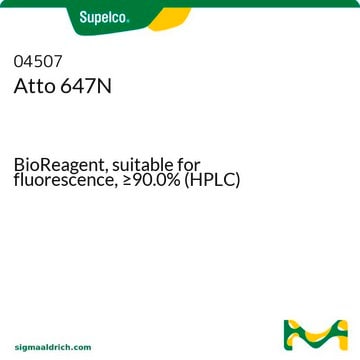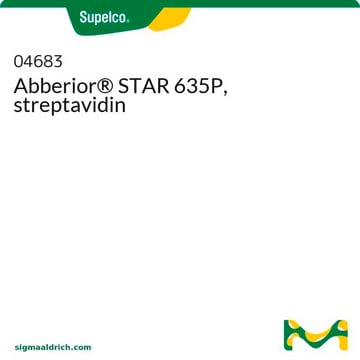43354
Abberior® STAR RED NHS
≥80.0% (degree of coupling)
Sign Into View Organizational & Contract Pricing
All Photos(1)
About This Item
UNSPSC Code:
12352108
NACRES:
NA.32
Recommended Products
Assay
≥80.0% (degree of coupling)
fluorescence
λex 637 nm; λem 660 nm±10 nm in water
storage temp.
−20°C
General description
Abberior STAR RED is an already well known dye named also KK114 in literature (a scientific web search shows more than 60 publications, a selection is listed below). Please note the minimal background signal due to negligible unspecific binding. A key feature of the dye is its comparably long lifetime of ~3.5ns. The dye works exceptionally well with the Abberior Instruments STED microscope as well as with the Leica STED microscope.
Abberior STAR RED can substitute Atto™ 647N, AlexaFluor 647, or Cy®5. It can be excited with diode lasers (635 nm, 650 nm) or with the 647 nm line of a Krypton laser. For STED, a depletion wavelength around 750 nm is recommended. Please see reference [2] for detailed characteristics.
Best results are obtained with freshly prepared samples.
Abberior STAR RED can substitute Atto™ 647N, AlexaFluor 647, or Cy®5. It can be excited with diode lasers (635 nm, 650 nm) or with the 647 nm line of a Krypton laser. For STED, a depletion wavelength around 750 nm is recommended. Please see reference [2] for detailed characteristics.
Best results are obtained with freshly prepared samples.
Application
Abberior™ STAR RED labelled cholesterol analogs were used for STED-FCS (stimulated emission depletion - fluorescence correlation spectroscopy) based measurements of membrane diffusion dynamics. Anti-mouse secondary antibody coupled to Abberior™ STAR RED has been used for STED microscopy imaging in Vero cell line.
Suitability
Designed and tested for fluorescent super-resolution microscopy
Other Notes
Legal Information
6538 is a trademark of American Type Culture Collection
Atto is a trademark of Atto-Tec GmbH
Cy is a registered trademark of Cytiva
abberior is a registered trademark of Abberior GmbH
Storage Class Code
11 - Combustible Solids
WGK
WGK 3
Flash Point(F)
Not applicable
Flash Point(C)
Not applicable
Certificates of Analysis (COA)
Search for Certificates of Analysis (COA) by entering the products Lot/Batch Number. Lot and Batch Numbers can be found on a product’s label following the words ‘Lot’ or ‘Batch’.
Already Own This Product?
Find documentation for the products that you have recently purchased in the Document Library.
Erdinc Sezgin et al.
Journal of lipid research, 57(2), 299-309 (2015-12-25)
Cholesterol (Chol) is a crucial component of cellular membranes, but knowledge of its intracellular dynamics is scarce. Thus, it is of utmost interest to develop tools for visualization of Chol organization and dynamics in cells and tissues. For this purpose
Franziska Curdt et al.
Optics express, 23(24), 30891-30903 (2015-12-25)
Despite the need for isotropic optical resolution in a growing number of applications, the majority of super-resolution fluorescence microscopy setups still do not attain an axial resolution comparable to that in the lateral dimensions. Three-dimensional (3D) nanoscopy implementations that employ
Roman Schmidt et al.
Nano letters, 9(6), 2508-2510 (2009-05-23)
Because of the diffraction resolution barrier, optical microscopes have so far failed in visualizing the mitochondrial cristae, that is, the folds of the inner membrane of this 200 to 400 nm diameter sized tubular organelle. Realizing a approximately 30 nm
Daniel Neumann et al.
PMC biophysics, 3(1), 4-4 (2010-03-09)
The voltage-dependent anion channel (VDAC, also known as mitochondrial porin) is the major transport channel mediating the transport of metabolites, including ATP, across the mitochondrial outer membrane. Biochemical data demonstrate the binding of the cytosolic protein hexokinase-I to VDAC, facilitating
Christian Kukat et al.
Proceedings of the National Academy of Sciences of the United States of America, 108(33), 13534-13539 (2011-08-03)
Mammalian mtDNA is packaged in DNA-protein complexes denoted mitochondrial nucleoids. The organization of the nucleoid is a very fundamental question in mitochondrial biology and will determine tissue segregation and transmission of mtDNA. We have used a combination of stimulated emission
Our team of scientists has experience in all areas of research including Life Science, Material Science, Chemical Synthesis, Chromatography, Analytical and many others.
Contact Technical Service

